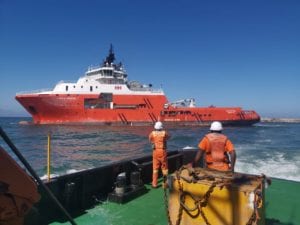Transnet National Ports Authority (TNPA) says the Port of Mossel Bay is well equipped to provide value following global energy giant Total’s significant gas condensate discovery on the Brulpadda prospects, located on Block 11B/12B in the Outeniqua Basin, 175 kilometres off the southern coast of South Africa.
Mossel Bay Port Manager Shadrack Tshikalange said the port’s role in the drilling expedition involved providing land and quay space for the logistics base operations, as well as marine services such as piloting, berthing, craft services and vessel and traffic control, to the vessels involved in the exercise. “The oil rig Deepsea Stavanger operated off this coastline and a number of vessels for the emerging oil industry called at Mossel Bay. During this particular exploration exercise the various supply vessels made regular use of our berths. Our port is also able to provide a craft service to do crew changes and stores delivery offshore,” said Tshikalange. Mossel Bay is the smallest of the commercial ports along the South African coast and lies halfway between Port Elizabeth and Cape Town. It is the only South African port that operates two off-shore mooring points within port limits.It is also home to one of only a few gas-to-liquids refineries around the world and South Africa’s smallest refinery, Mossgas, built by South Africa’s national oil company Petro SA in 1989, though the port deals mostly with the fishing industry. The Brulpadda find contains condensates – a kind of light crude oil – which only PetroSA’s Mossel Bay refinery can process.
Total’s drilling campaign commenced in November 2018 and is due to be completed between February and March 2019. It involves one rig and a fleet of four vessels being managed by AfriShore Shipping on behalf of Total.






